【教育资料】人教版高中英语必修四 Unit2 Working the land-词汇篇(学生版)学习专用
人教版高中英语必修四Unit 2《Working the land》课件
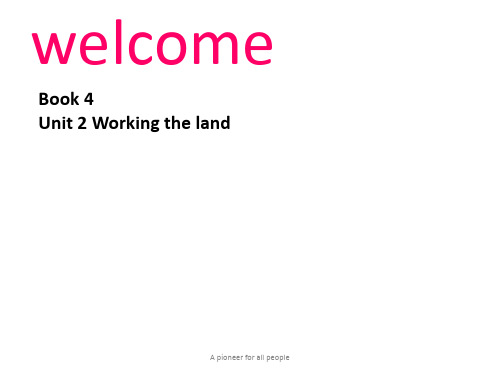
A pioneer for all people
Sympathy for peasant
Farmers weeding at noon, Sweat down the field soon. Who knows food on a tray,
Due to their toiling day?
A pioneer for all people
Pay attention to the first Dream or the last sentence
Para 2
Para 3 Para 4
Contribution
Appearance & achievement
A pioneer for all people
A pioneer for all people
D. He searched a way to increase rice outputs without expanding the area of fields.
E. He helps rid the world of hunger by circulating his knowledge in less developed countries.
a
c
b
d
e
A pioneer for all people
Hobbies
swimming mahjong
Para. 3
violin
A pioneer for all people
reading
Para. 3
True or False ( ) He doesn’t wants to be more famous. care about being famous ( ) He cares little a lot about money and fame. ( ) Yuan Longping leads an uncomfortable a comfortable life. ( ) He gives millions of money to equip others for their research in agriculture.
高中英语人教版必修4《Unit2 Working The Land》课件

7.__________ vt.& vi.输出,出口 8.__________ n.工作,职业,占据
9.__________ vt.& n.遗憾,后悔 10.__________ vt.减少,减缩 11.__________ vt.浏览,略读 12.__________ n.评论,议论 vi.& vt.表达意见,作出 评论
阅读理解之细节理解题(二) 排列顺序题
细节排序题的考核情势是在选项中罗列一些具体的事 实,然后对上面的事实进行排序。要求考生根据事件产生的 先后顺序以及句子之间的逻辑关系,找失事件产生、发展的 正确顺序。
(2012·江苏高考·C)
[1]Medical drugs sometimes cause more damage than they cure.One solution to this problem is to put the drugs
of 13.Thanks to 14.satisfied with
Ⅲ.仿写式活用句型 1.In 1974,he became the first agricultural pioneer in the world to grow rice that has a high output. 【句式仿写】 他是第一个报名参加比赛的人。
【答案】 1.thanks to 2.rid...of 3.be satisfied with
4.would rather 5.逐渐增强,建立,开发 6.导致, 造成(后果) 7.集中(注意力,精力)于 8.使……免受(影响,
伤害) B.用上面词组的适当情势填空 9.We should __________ our attention __________ our
人教新课标高中英语必修四Unit2WorkingthelandWarmingUp课件
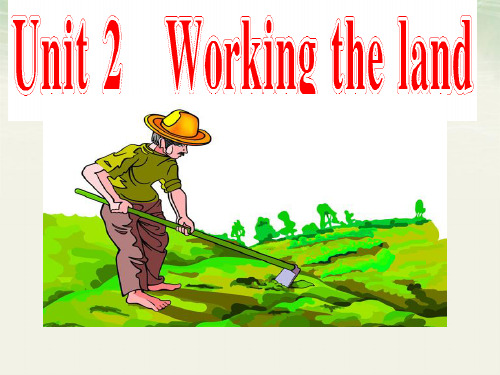
1)能正确朗读、拼写本单元所有单词、短语 2)熟悉本单元单词的词形变化
二、学习重点:
制作本单元话题词汇的思维导图(mind-map)
学习难点:
利用本单元话题词汇用英语说说农民如何耕作
【预学案】
Work in groups to find out as much vocabulary about“Working the land”as possible Steps of farming(耕作过程): 犁地 播种 灌溉 农产品 Ways of farming(耕作方式): 化学耕作 有机耕作
soil
【当堂训练】
Work in groups and find out as many derivatives (派生词)of some words in the mind-map as possible.
ploughing n. 耕作,耕翻
plough n. 犁 vi.用犁耕地
seeding irrigation
Work in groups and tell in class: how farmers work the land. You can use the mind-map to help you.
How farmers work the land
Farmers XXX take the following steps to work the land. First, plough. Second, seed. Third, irrigate. Finally, harvest. They XXX harvest a lot of products, such as rice, wheat, sorghum, soybean, peanut, corn and so on.
新人教版高中英语必修四unit 2《working the land》优秀教案2(重点资料).doc
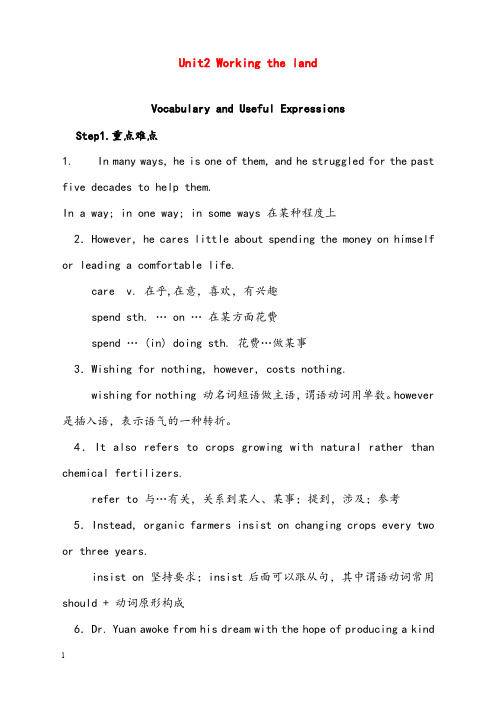
Unit2 Working the landVocabulary and Useful ExpressionsStep1.重点难点1. In many ways, he is one of them, and he struggled for the past five decades to help them.In a way; in one way; in some ways 在某种程度上2.However, he cares little about spending the money on himself or leading a comfortable life.care v. 在乎,在意,喜欢,有兴趣spend sth. … on …在某方面花费spend … (in) doing sth. 花费…做某事3.Wishing for nothing, however, costs nothing.wishing for nothing 动名词短语做主语,谓语动词用单数。
however 是插入语,表示语气的一种转折。
4.It also refers to crops growing with natural rather than chemical fertilizers.refer to 与…有关,关系到某人、某事;提到,涉及;参考5.Instead, organic farmers insist on changing crops every two or three years.insist on 坚持要求;insist后面可以跟从句,其中谓语动词常用should + 动词原形构成6.Dr. Yuan awoke from his dream with the hope of producing a kindof rice that could fees more people.with the hope of 带着某种希望7.He used to walk to his fields twice a day, but now he prefers to ride his motorcycle.used to 过去常常(现在已经不是如此)be used to doing 意思是“习惯于”prefer to do (rather than do) 相比之下更喜欢做某事8.But whatever they grow they make sure that what is left in the ground after harvesting becomes a natural fertilizer for the next year’s crop.whatever引导让步状语从句,表示“无论怎样”,相当于no matter what. Eg: Whatever you do, don’t give up.Step 2.功能句型建议(Suggestion & advice)I would rather … I don’t like … because …I’d prefer … because … It’s a great pity that …Should we/I …? It’s better to …If I have a choice I’d choose … because … You need to …May I suggest …? Let me suggest … because …Perhaps we should suggest … because … But what/how about …?Step 3. 重点单词及短语单词① hunger n. 饥饿,食欲;v. 渴望得到某事物,某人hunger for/after sth./sb.② struggle vi.stuggle with sb. 与某人争斗,搏斗struggle (against/with sb./sth.)struggle against/with sb./sth. (for sth.) 争斗,拼搏,奋斗,努力③ expand vi. (使某事物)变大,增强,伸展,张开expand on sth. 阐述或详述expansion n. 扩大,扩展,膨胀④ equip vt.equip sb./sth. (with sth.) 配备,装备equipment n. 设备,装备⑤ export vt. 输出;n. 出口业,出口品import vt. 进口⑥ circulate vi. vt. 使某物循环,流通,传播;vt. 发侧知告知某人 circulation n. 循环,流传,传播⑦ confuse vt. 把某人弄糊涂,使为难,打乱confusion n. 混乱,混淆⑧ reduce vt. 缩减,减小,降低reduction n. 减少,缩小⑨ supply vt. 供给,供应,满足;n. 供应,供给之物⑩ exchange vt. 交换,交易;n. 交换,更换,互访,交流 exhange sth. with sth.exchangeable adj. 可交换的,可退换的,可兑换的短语rid … of 清除,摆脱be satisfied with = be contented 感到满足,满意的would rather do sth. 宁可做某事refer to 与…有关,关系到某人,某事,提到,参考search for 寻找,搜寻thanks to 多亏,由于rather than 而不,宁愿…而不Unit2 Working the landWarming Up, Pre-reading and Reading Period 1 Warming up and pre-reading.Step 1 Lead-in.Poem By Li ShenFarmers weeding at noon,Sweat down the field soon. Who knows food on a tray,Due to their toiling day.Then let one student recite the poem in Chinese.Step 2 Warming up by questioningHello, everyone. We shall read about man who works the land today. Have you ever grown any plants? If not, what kind of plant would you like to grow? How will you grow it?(For reference: Mr. Li, I worked with my father in the rice field last year. We grow hybrid rice and use animal wastes to make the soil rich.)Has anyone of you ever been to the countryside? What did you do there? (For reference: I went to Chuankou the day before yesterday. It is a small mountain village 75 li north of Beijing. I went there to visit my uncle’s family. I like that small beautiful village very much. )Who are from a farmer’s family? What do you know about farming? Step 3 Pre-reading and talkingQuestioning and answeringRice is main food in South China. What do you think would happen if tomorrow there was suddenly no rice to eat?(For reference: Then the south people would have to change their eating habit. They could turn to potatoes, wheat flour, cow and sheep cheese, cabbage, onions and garlic for food. They are the bases ofthe traditional food in North China. )If you had the chance to do one thing to help end hunger in the world, what would you do?(For reference: I would try to end hunger by popularizing the advanced farming techniques. Modern techniques could be introduced to increase the rice output, and expand the area of fields.)Giving background information about Professor Yuan Longping Have you ever heard of a man called Professor Yuan Longping? Would anyone of you tell the class something about him?(For reference: Professor Yuan Longping is a Chinese agricultural scientist. Professor Yuan's breakthrough scientific achievement led to the world's first successful and widely grown hybrid rice varieties, revolutionizing rice cultivation in China and tripling production over a generation. His approach to rice breeding then spread internationally throughout Asia and to Africa and the Americas, providing food for tens of millions and leading to his becoming known as the "Father of Hybrid Rice."Step 4. ReadingReading aloud to the recordingComprehension—understanding what you are reading—is important. To read in thought groups is an easy, yet effective, way of improving reading comprehension. Now turn to page 9 and read aloud to therecording of the text A PIONEER FOR ALL PEOPLE. Pay attention to the thought groups in the sentences while listening and reading aloud.A brief introduction:Yuan Longping is known as China’s “father of hybrid rice”. It’s said that in China, we eat depending on “Two Ping” ---- Deng Xiaoping, who made the policy of System of Production Responsibility, & Yuan Longping, who invented hybrid rice.Yuan Longping, who was born in September, 1930, graduated from Agriculture Department in Southwest Agricultural Institute. He has been working on agriculture education & the research into hybrid rice since he left the institute.In the 1960s, when China was suffering from serious famine, he came up with the idea of hybrid rice, which has a high yield ( or output). Ten years later, he succeeded in inventing a new species that produced a 20 percent higher yield than common types of rice. Yuan devoted himself to the research into agriculture, & was honored by UNESCO & FAO(联合国教科文组织). Although he is 74 years old, he is still working on the research into agriculture.Period 2 ReadingStep 1 Lead-in。
人教版高中英语必修四:Unit 2 Working the land (共24张PPT)

Mind Map of Regret
regret vt./n
regret sth 后悔某事
regret (not )doing/having
done 后悔做过某事
regret that clause后悔…
regret to do(tell/say/inform you that…)遗憾将要(说/告知你…)
rid
rid…of… 摆脱,除去
be/get rid of 除掉,摆脱
If the plane leaves the ground and you are not with him, you regret it maybe not today, maybe not tomorrow, but soon and for the rest of your life.
1.The man didn’t regret his decision. 2. The man regretted not having helped the woman earlier. 3.I regret that we have not been able to do better. 4,I regret to tell you that you have failed again. 5.Much to my regret, I didn’t make full use of the time.
Unit 2 Working the land
From Ma Yun’s words, we know that not everyone can succeed easily. Whatever we do, we should be optimistic, brave and persistent, and then we will be successful one day. Therefore, if we have a dream, just follow it and struggle for it.
高中英语unit 2 working the land知识点剖析 新课标 人教版 必修4
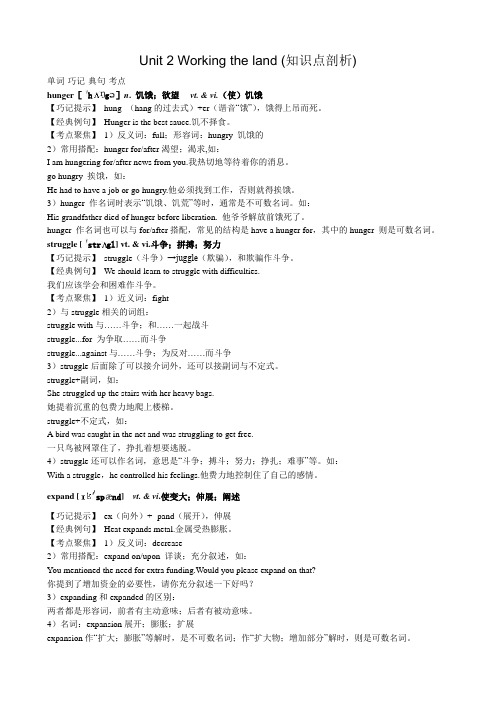
make a reduction打折扣at a reduction of打……折扣
3)与reduce相关的词组:
reduce to使……变为(更小尺寸或更简单形式);使成为某种状态;
reduce by(以……的比例、程度)减少。
supply [s pla ]n.补给;供给;供应品vt.补给;供给;提供
2)与struggle相关的词组:
struggle with与……斗争;和……一起战斗
struggle...for为争取……而斗争
struggle...against与……斗争;为反对……而斗争
3)struggle后面除了可以接介词外,还可以接副词与不定式。
struggle+副词,如:
She struggled up the stairs with her heavy bags.
The school supplies the children with books.= The school supplies books to/for the children.学校为孩子们提供书籍。
2)supplyn.作“供给;供应”解时,是不可数名词;作“供应量;供应品”解时,是可数名词。
road路;道路,指通车的宽广平坦的大路;
path小路,只供人行的路,不是开出来的,而是走出来的路;
Unit 2 Working the land (知识点剖析)
单词·巧记·典句·考点
hunger[ h g ]n.饥饿;欲望vt. & vi.(使)饥饿
【巧记提示】hung(hang的过去式)+er(谐音“饿”),饿得上吊而死。
【经典例句】Hunger is the best sauce.饥不择食。
人教版高中英语必修4Unit2_Working_the_land教案

Unit2 Working the land单元总体教案1.重点难点1. In many ways, he is one of them, and he struggled for the past five decades to help them.In a way; in one way; in some ways 在某种程度上2.However, he cares little about spending the money on himself or leading a comfortable life.care v. 在乎,在意,喜欢,有兴趣spend sth. … on … 在某方面花费spend … (in) doing sth. 花费…做某事3.Wishing for nothing, however, costs nothing.wishing for nothing 动名词短语做主语,谓语动词用单数。
however是插入语,表示语气的一种转折。
4.It also refers to crops growing with natural rather than chemical fertilizers.refer to 与…有关,关系到某人、某事;提到,涉及;参考5.Instead, organic farmers insist on changing crops every two or three years.insist on 坚持要求;insist后面可以跟从句,其中谓语动词常用should + 动词原形构成6.Dr. Yuan awoke from his dream with the hope of producing a kind of rice that could fees more people.with the hope of 带着某种希望7.He used to walk to his fields twice a day, but now he prefers to ride his motorcycle.used to 过去常常(现在已经不是如此)be used to doing 意思是―习惯于‖prefer to do (rather than do) 相比之下更喜欢做某事8.But whatever they grow they make sure that what is left in the ground after harvesting becomes a natural fertilizer for the next year’s crop.whatever引导让步状语从句,表示―无论怎样‖,相当于no matter what.Eg: Whatever you do, don’t give up.2.功能句型建议(Suggestion & advice)I would rather …I don’t like … because …I’d prefer … because …It’s a great pity that …Should we/I …?It’s better to …If I have a choice I’d choose … because … You need to …May I suggest …? Let me suggest … because …Perhaps we should suggest … because … But what/how about …?3. 重点单词及短语单词① hunger n. 饥饿,食欲;v. 渴望得到某事物,某人hunger for/after sth./sb.② struggle vi.Struggle with sb. 与某人争斗,搏斗struggle (against/with sb./sth.)struggle against/with sb./sth. (for sth.) 争斗,拼搏,奋斗,努力③ expand vi. (使某事物)变大,增强,伸展,张开expand on sth. 阐述或详述expansion n. 扩大,扩展,膨胀④ equip vt.equip sb./sth. (with sth.) 配备,装备equipment n. 设备,装备⑤ export vt. 输出;n. 出口业,出口品import vt. 进口⑥ circulate vi. vt. 使某物循环,流通,传播;vt. 发侧知告知某人circulation n. 循环,流传,传播⑦ confuse vt. 把某人弄糊涂,使为难,打乱confusion n. 混乱,混淆⑧ reduce vt. 缩减,减小,降低reduction n. 减少,缩小⑨ supply vt. 供给,供应,满足;n. 供应,供给之物⑩ exchange vt. 交换,交易;n. 交换,更换,互访,交流exhange sth. with sth.exchangeable adj. 可交换的,可退换的,可兑换的短语rid … of清除,摆脱be satisfied with = be contented 感到满足,满意的would rather do sth. 宁可做某事refer to 与…有关,关系到某人,某事,提到,参考search for 寻找,搜寻thanks to 多亏,由于rather than 而不,宁愿…而不分课时教案Period 1 Warming up and Pre-reading.Step 1. Lead-in.Poem By Li ShenFarmers weeding at noon,Sweat down the field soon.Who knows food on a tray,Due to their toiling day.Then let one student recite the poem in Chinese.Step 2. Warming up by questioningHello, everyone. We shall read about man who works the land today. Have you ever grown any plants? If not, what kind of plant would you like to grow? How will you grow it?(For reference: Mr. Li, I worked with my father in the rice field last year. We grow hybrid rice and use animal wastes to make the soil rich.)Has anyone of you ever been to the countryside? What did you do there?(For reference: I went to Chuankou the day before yesterday. It is a small mountain village 75 li north of Beijing. I went there to visit my uncle’s family. I like that small beautiful village very much. )Who are from a farmer’s family? What do you know about farming?Step 3. Pre-reading and talkingQuestioning and answeringRice is main food in South China. What do you think would happen if tomorrow there was suddenly no rice to eat?(For reference: Then the south people would have to change their eating habit. They could turn to potatoes, wheat flour, cow and sheep cheese, cabbage, onions and garlic for food. They are the bases of the traditional food in North China. )If you had the chance to do one thing to help end hunger in the world, what would you do?(For reference: I would try to end hunger by popularizing the advanced farming techniques. Modern techniques could be introduced to increase the rice output, and expand the area of fields.) Giving background information about Professor Yuan LongpingHave you ever heard of a man called Professor Yuan Longping? Would anyone of you tell the class something about him?(For reference: Professor Y uan Longping is a Chinese agricultural scientist. Professor Yuan's breakthrough scientific achievement led to the world's first successful and widely grown hybrid rice varieties, revolutionizing rice cultivation in China and tripling production over a generation. His approach to rice breeding then spread internationally throughout Asia and to Africa and the Americas, providing food for tens of millions and leading to his becoming known as the "Father of Hybrid Rice."Step 4. ReadingReading aloud to the recordingComprehension—understanding what you are reading—is important. To read in thought groups is an easy, yet effective, way of improving reading comprehension. Now turn to page 9 and read aloud to the recording of the text A PIONEER FOR ALL PEOPLE. Pay attention to the thought groups in the sentences while listening and reading aloud.A brief introduction:Yuan Longping is known as China’s ―father of hybrid rice‖. It’s said that in China, we eat depending on ―Two Ping‖ ---- Deng Xiaoping, who made the policy of System of Production Responsibility, & Yuan Longping, who invented hybrid rice.Yuan Longping, who was born in September, 1930, graduated from Agriculture Department in Southwest Agricultural Institute. He has been working on agriculture education & the research into hybrid rice since he left the institute.In the 1960s, when China was suffering from serious famine, he came up with the idea of hybrid rice, which has a high yield ( or output). Ten years later, he succeeded in inventing a new species that produced a 20 percent higher yield than common types of rice.Yuan devoted himself to the research into agriculture, & was honored by UNESCO & FAO(联合国教科文组织). Although he is 74 years old, he is still working on the research into agriculture. Step 5 课后反思:Period 2 ReadingStep 1. Lead-in. Listen to the tape carefully then answer these questions.1)When and who did become the first agricultural pioneer in the world to grow rice that has a high output?2)What did Yuan Longping invent?Step2. Read the passage once again,then find out these sentences true or false.1)Dr Yuan is more a farmer than a scientist.2)Dr Yuan’s kind of rice is the most suitable for China’s farmland.3)Dr Yuan would rather work than relax.4)Dr Yuan has dreams when he is asleep and also when he is awake.5)Dr Yuan enjoys a simpler life than most rich and famous people.Step3. Find out the topic sentences of each paragraphPara. 1: He became the first agricultural pioneer in the world to grow rice that has a high output. Para.2:He has devoted his life to finding ways to grow more and more rice..Para.3:He cares little about spending the money on himself and would rather keep time for his hobbies.Para.4 Dr. Yuan’s dreams.Step4. Write down Y uan Longping’s personal informationIn pairs, read the text, find information to complete the following form.Facts about Yuan Longping Facts abou t Yuan’s super hybridriceage capacityeducation applicationmajor contributionhobby overseasideal futureStep 5 课后反思:Period 3 using languageStep 1. Language points:1. Struggle for…为争取……而斗争Struggle against…为反对……而斗争Struggle wi th… 与……争斗1)The swimmer struggled against the tide.2)We had to struggle with/against all kinds of difficulties.3)The slaves struggled for the freedom2. 使做…成为… make +it +adj./n. +to do好天气使游泳成为可能The fine weather makes it possible( for us )to swim.他将每早跑步做为一个规则He makes it a rule to run every morning.其他可用这种结构的词:feel, find, think, consider…3.搜查,搜索search (sb. / sth.) for …He searched all the rooms for the missing person.They searched the man all over for money.4.由于,多亏thanks to 相当于because of5.是从前两倍那么多twice as large as before相当于once larger than before6.对……感到满意be satisfied with…相当于be pleased withadj. satisfactory/satisfyingn. satisfaction7.在乎,在意care about比较care forMy aunt cared for me when my parents were away last week.Dr Yuan never cares about money and fame.8. Indeed, his sunburn face and arms and his slim, strong body are like those of millions of other Chinese farmers.e.g: The streets in Beijing are wider than those in my hometown.The number of students in our school is larger than that in their school.9. Dr Yuan grows what is called super hybrid rice.e.g: He came to what is called America.10. This special strain of rice makes it possible to produce one -third more of the crop in the same fields.e.g: That made it possible for life to begin to develop.The development of science makes it possible for us to know more about the universe.11. Dr Yuan awoke from his dream with the hope of producing a kind of rice (that could feed more people).e.g: He went to the U.S with the hope of finding a better job there.Step 2. Closing down by having a dictationTo end the period you will take a dictation. It is about Yuan Longping, ―Father of Super hybrid rice‖.Yuan Longping, China's Most Famous "Farmer"Yuan came up with the idea of hybridizing rice for the first time in the world in 1960s. Since then, 50 percent of China's total rice cultivation fields have grown such rice, which added some 300 billion kilograms to the country's grain output. Furrows grown on his sunburnt face, aslim figure and coiled-up trousers legs would confuse foreign reporters who came to interview the most famous scientist in China, who would rather be called ―a farmer‖. Indeed, like many Chinese farmers, Yuan in his 70s and has devoted most of his life growing rice in paddy fields, but unlike those farmers, he reaps the seed from experimental fields only for hybridizing rice.Step 3 课后反思:Period 4 Listening, Speaking and WritingLearning Aims:To help students read the passage Organic Farming.To help students to use the language by reading, listening, speaking and writing.Teaching Procedures:Step 1. Warming up by listening and reading aloudLanguage is created to be listened to and spoken first. So open your book to page 13 and read it aloud while listening to the recording. Watch your pauses between the thought groups.Step 2. Guided reading1. Reading and translatingRead the text sentence by sentence, and put it into Chinese. Who will be the first to try. I will only have four of you to do this task.2. Reading and underliningNext you are to read and underline all the useful expressions or collocations in the passage. Copy them to your notebook after class as homework.Collocations from textgain a meaning, refer to…, make the soil fertile, natural waste from animals, put…in the field, make the soil rich, become healthy, develop a healthy soil, reduce diseases, grow strong and healthy, keep…free from…, leave…in the ground, as a result, get exhausted, kill bacteria and pests, insist on…, change crops, be followed by…, put…back into …, need a deeper level of soil, prefer doing sth., plant…between crops, prevent…from…, carry away…, make sure that3. Doing exercisesNow you are going to do exercises No. 1, 2 and 3 on page 14 following the article.4. ListeningFor listening turn to page 14 and then 15 for the listening exercises 1, 2 and 3. Are you ready? 5. Reading, speaking and writingWhen trying to argue people into or out of doing something we may use the following expressions:I would rather…I don’t like…because…I’d prefer…because It’s a great pity that…Should I / we…?It’s better to…This is good value because…If I have a choice I’d choose…becauseWhat is the advantage of…?You need to…In pairs you are to make up a dialogue to argue each other into or out adopting organic farming. I will argue with your monitor, Liang Bochao. Get started.Step 3. Guided writing1. Writing a posterWriting a poster which includes all the information about the uses of computer so that you will encourage more farmers to buy and use. You are asked to base your poster on the overall pattern of the article you learned Organic Farming. Limit your poster to between 200 and 250 words.2. Writing a speechWrite a speech for Professor Yuan Longping. He is to attend an international conference on modern agriculture. You may also make use of the library and network resources for the task. Step 4. Further applying1. Finding informationRead online to find as much information as possible about Professor Yuan Longping and his research group. Share your findings with you partner next time you are here.2. Writing a reportGo back home to interview your parents or your grandparents about China’s agriculture, its past and present situations. Write a report in English in about 500 words as a weekly project.3. Acting a text playTurn either one of the two articles into a text play. Rehearse it and play it in front of the class. The play shall last at least 10 minutes.Step 5. Closing down1.Closing down by filling a formTo end the period, please fill in the form below.What is organic farming?definitioncharacteristicspotentials2. Closing down by imagingImagine and write about what the agriculture will be like 50 years from now in the future. Use your imagination to compete for ―wild thinking prize‖.Step 6 课后反思:Period 5 Grammar and Useful Structures Learning AimsTo help students learn about The –ing form as the Subject & Object.To help students discover and learn to use some useful words and expressions.To help students discover and learn to use some useful structures.Teaching ProceduresStep 1. Warming upWarming up reading aloud the text A PIONEER FOR ALL PEOPLELanguage is learned in context. So let’s first r eview the text learned yesterday by reading it aloud. Try to force out your English slowly and clearly.Step 2. Discovering useful words and expressionsIn pairs do the exercises 1, 2 and 3 . You must finish them in 5 minutes.Step 3. Learning about grammar1. Read and identifyRead the text about Yuan Longping again, paying attention to the sentences which use the –ing form as the subject and object.In the sentence ―Wishing for things, however, cost nothing. ―the –ing is used as subject.It can be also used as object of the sentence. For example: Yuan Longping likes playing his violin.2. Consolidating by do exercisesTo consolidate your understanding you will be given 10 minutes to go over exercises 1,2,3,4 and 5 on pages 12 and 13. You may just writ e on your text book. I mean the student’s book you are working by.Step 4. Ready used materials for The v–ing form as the Subject & Object)语法学习——动名词1. 动名词作主语1)名词直接放在句首作主语。
人教版高中英语必修4《Unit 2 Working the land》教案
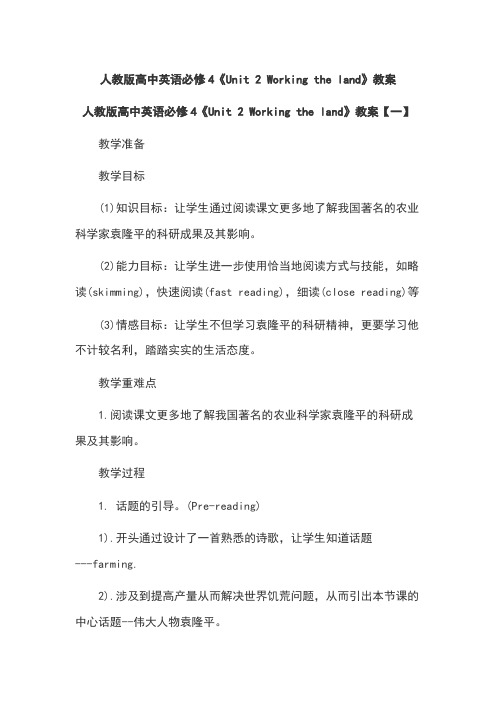
人教版高中英语必修4《Unit 2 Working the land》教案人教版高中英语必修4《Unit 2 Working the land》教案【一】教学准备教学目标(1)知识目标:让学生通过阅读课文更多地了解我国著名的农业科学家袁隆平的科研成果及其影响。
(2)能力目标:让学生进一步使用恰当地阅读方式与技能,如略读(skimming),快速阅读(fast reading),细读(close reading)等(3)情感目标:让学生不但学习袁隆平的科研精神,更要学习他不计较名利,踏踏实实的生活态度。
教学重难点1.阅读课文更多地了解我国著名的农业科学家袁隆平的科研成果及其影响。
教学过程1. 话题的引导。
(Pre-reading)1).开头通过设计了一首熟悉的诗歌,让学生知道话题---farming.2).涉及到提高产量从而解决世界饥荒问题,从而引出本节课的中心话题--伟大人物袁隆平。
2. 跟读与限时阅读完成导学案练习贯彻目的与困难策略,指导学生根据不同的阅读目的,在阅读的不同阶段,灵活使用各种阅读策略,捕捉文章主要信息,理解作者的写作意图,突破本文的教学重点与难点。
采用整体语言教学法和任务型语言教学法。
1)、通过限时阅读训练,引导学生如何利用略读(skimming)的方法把握文章的大意,侧重培养快速阅读理解能力和文章中心把握能力。
2)、精读各个段落语段,侧重培养快速捕捉文章重要细节的能力和猜测生词的能力,学会欣赏文章中的优美句子。
3:阅读过程--浅层次阅读。
(Reading I)1). 其中关于人物的基本信息中,通过设计了一个信息表格的浅层次阅读练习,对文中人物有了初步了解。
2). 关于他的梦想,书本上描写得非常生动,我让班里有艺术特长的学生画了一幅漫画,利用画面反映课文第四段所描述的内容,同时用第一人称配了声音效果。
4. 阅读过程--深层次阅读。
(Reading II)在处理了一些简单信息之后,阅读人物最重要的是要读出人物不同于其他人的成就以及值得学生学习的一些可贵品质。
- 1、下载文档前请自行甄别文档内容的完整性,平台不提供额外的编辑、内容补充、找答案等附加服务。
- 2、"仅部分预览"的文档,不可在线预览部分如存在完整性等问题,可反馈申请退款(可完整预览的文档不适用该条件!)。
- 3、如文档侵犯您的权益,请联系客服反馈,我们会尽快为您处理(人工客服工作时间:9:00-18:30)。
Unit2 Working the land词汇篇__________________________________________________________________________________ __________________________________________________________________________________ 要求学生掌握本单元的重点单词、重点短语、重要词汇辨析并能熟练应用。
一、重点短语1. thanks to 由于,因为,幸亏owing to 因为,由于(可作表语和状语)because of 因为(强调因果关系)as a result of 由于(强调某一事件造成的后果)due to 因为,由于2. rid …of…使……摆脱,除去get/be rid of…摆脱……;除去……rid oneself of… 摆脱;从……中解脱break away from…摆脱……3.be satisfied with 对……感到满意4.would rather 宁肯,宁愿(后跟动词原形,其否定形式为would rather not do sth.)5.build up 逐渐增强;建立,开发set up 建立put up 举起;张贴;搭建take up 拿起;从事;占据(空间等)6.lead to 导致,造成(后果);通向……7. focus on 集中;把……集中在……8. keep… free from/of 使……免受(影响、伤害等);使……不含(有害物)二、同义辨析1. expand/stretch/extendexpand指向四面八方的扩大、扩张E.g. I owned a bookshop and desired to expand the business.stretch指由短变长的伸展E.g. This sweater has stretched.extend强调向某一方向的延长E.g. His influence extends beyond the TV viewing audience.2.thanks to/owing to/due to/because of/as a result of三、要点梳理1. If so句式if so如果这样if not如果不是这样if any如果有的话或即使有的话if ever如果曾经有过或即使有过的话if possible如果可能的话if necessary.如果必要的话2. struggle (vi.)& (n.)struggle with/against与……斗争struggle for努力争取……;为……而斗争struggle to one’s fee挣扎着站起来tstruggle to do sth.努力做某事3. hunger(n.)饥饿;欲望;渴望&(v.)(使)饥饿;渴望be hungry for…渴望得到……go hungry吃不饱;挨饿hunger to do sth.渴望做某事hunger for/after sth.渴望做某事4. expand (vt.&vi.)使变大;伸展expand… into…把……扩展/发展成……5. rid… of …使……摆脱/除去……be/get rid of…摆脱rid oneself of…从……解脱rob sb. of sth.抢劫某人某物warn sb. of sth.警告某人某事remind sb. of sth.提醒某人某事inform sb. of sth.通知某人某事cure sb. of sth.医好某人的病6. be satisfied with对……满意to one’s satisfaction使某人满意的是be satisfied of 使相信某事be satisfied that确信……satisfying(adj.)令人满意的satisfaction(n.)满意;满足satisfactory(adj.)令人满意的7. would rather宁愿;宁可would rather(not) do sth.宁愿(不)做某事would rather have done sth.宁愿做过某事would do sth. rather than do sth.=would rather do sth. than do宁愿做某事(而)不愿做某事/与其做某事倒不如做某事would rather+从句(句子需用虚拟语气)8. Therefore(adv.)因此;所以;因而用在句首,其后要有逗号E.g. Therefore, we must learn English well.用在两个分句之间,即一个句子的一部分表示原因因而另一部分表示结果时,一般其前要用分号;若第二个分句前是逗号或无符号,则要注意前加andE.g. I had a headache; therefore I could not go to your party.I was ill, and therefore could not go therefore.9. equip (vt.&vi.)配备;装备equip…with…用……装备……equip sb./ sth. for使某人/某事具有……be equipped with装备;配备be fully /poorly equipped 装备齐全/简陋equipment(n.)设备;装备a piece of equipment一件设备office equipment办公室设备10. die from死于……die of/from死于……die away逐渐消失die down逐渐转弱die off相继死去die out灭绝,消失die for为……牺牲11. in need ofin( great)need of (非常)需要(后常跟名词)in need 需要in memory of为了纪念……in praise of为了表扬……in case of如果,即使in favor of赞成in honor of为纪念/庆祝……in face of面对12. confuse (vt.)使迷惑;使为难confuse A with/and B把A与B混淆be confused about sth.对……感到困惑be/get confused by sth.被……搞糊涂regret (vt.)遗憾;惋惜&(n.)遗憾;懊悔regret doing sth.后悔做了某事regret to say/inform that…遗憾地说/告知……regret that从句遗憾……with great/deep regret很遗憾to one’s regret=to the regret of sb.让某人感到遗憾的是regrettable(adj.)令人遗憾的;可惜的regretful(adj.)遗憾的;后悔的13. build up逐渐增加;建立;开发build up to sth.为……做准备build oneself up增强体质build up a fame建立名声build up one’s health/body增进健康build up(=form steadily)意为“逐步建立;逐步形成”,如build up one’s strength(增强体力)。
build 还指“建造;建筑”,如build a house(建房子)14. lead to导致;造成(后果);通向lead sb.to a place引导某人去某个地方lead up to导致;渐渐引到(某个话题)lead a …life过……的生活lead sb. by the nose完全支配某人15. focus on集中(注意力、精力等)于focus one’s attention/mind on集中精力于……focus …on…将……聚集于……be focused on 集中精力/注意力(=concentrate on)come into focus (问题)显著突出focus one's attention on 集中注意力于bring …into focus 聚焦于16. reduce (vt.)减少;缩减reduce…by…把……减少了……reduce…to…把……减少到……;将……概括成……be reduced to陷入某种境地17. keep…free from/of使……免受(影响、伤害等);使……不舍(有害物)18. be free from/of不受……伤害for free/free of charge免费free sb./oneself/sth. from/of sth.解除;去除freely(adv.)自由地freedom(n.)自由19. comment (n.) 评论;议论(v.)表达意见;作出评论make/have comments on/upon srh.评论某事no comment无可奉告comment on/upon对……发表评论20.circulate (adj.) 值得做的,值得的(vt.& vi.)循环,流通;流传circulation(n.) 流通,循环circulate rumor 散布谣言circulate secret 传播秘密circulate rapidly 很快传开circulate slowly 流通滞缓circulate widely 广泛流传例1.(2019甘肃河西一联)I would rather_______ to work after my graduation, but my father would rather I________ abroad for further education.A. go; had goneB. go; wentC. went; wentD. went; will go例 2. (2019浙江宁波期始)At times the balance in nature is _______, resulting in a number of possibly unforeseen effects.A. troubledB. confusedC. disturbedD. puzzled例3.(2019福建清流段考)People all over the world _______ for peace.A.leaveB. hungerC. comeD. work例4.(2019福建)The climate here is quite pleasant, the temperature rarely,______ ,reaching 30。
